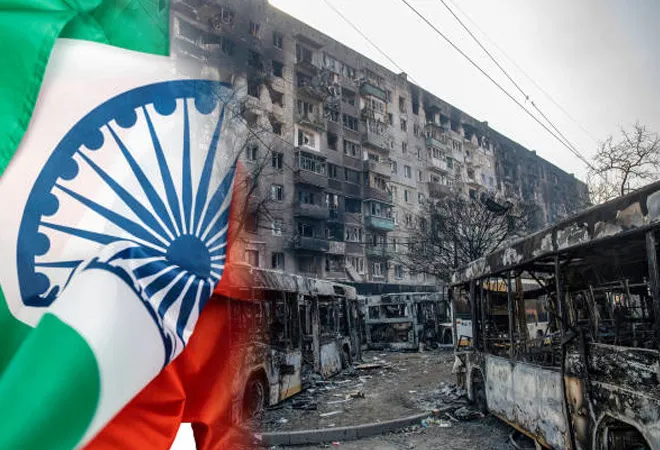
Is India vacillating in response to the Ukraine crisis? Perhaps not. India would have been at the receiving end of disapprovals no matter which side it took. But as a rising power, contending with India’s minimum expectations is problematic. Today’s India has greater agency in shaping diplomacy around crises, unlike in the past. For example, India was publicly supportive of the erstwhile Soviet Union’s invasion of Afghanistan in 1979, while a disapproving Indira Gandhi simultaneously sought a regional strategy against the occupation. Neither approach altered the Soviet state’s behaviour.
Today, with an economy half the size of India’s, it would have been difficult for Russia to ignore India’s demand for the creation of a humanitarian corridor to evacuate its civilians. Russia heeded India’s demands and helped repatriate about 22,500 citizens (24 percent of Ukraine’s international students are Indian). The world quietly acknowledged the realism underlying India’s diplomatic and logistical response to the crisis. Now that the students have been safely repatriated, this phase of Indian diplomacy has run its course.
How did India’s diplomacy shape?
India couldn’t have tilted towards both parties at the same time, thus it aimed to remain neutral. In Prime Minister Modi’s calls with Presidents Putin and Zelenskyy on 24 and 26 February, and Foreign Secretary Shringla’s media interaction on 25 February, India called for “dialogue,” “cessation of violence,” and “safety” and “safe exit and return” of Indian nationals.
The US State Department also recalled a cable asking American diplomats to take their Indian and Emirati counterparts to task for their countries’ “neutral” stand on Ukraine placing them in “Russia’s camp”.
Following that, India shifted its position, making references to the “UN Charter,” “international law,” and “sovereignty and territorial integrity of states.” In his telephonic conversation with Putin on 7 March, Modi reiterated his call for “cessation of the conflict” and expressed “deep concern” for the safety and security of Indian students. In contrast, in his call with Zelenskyy the same day, Modi called for “cessation of violence” and thanked Zelenskyy for Ukraine’s help in securing the safe exit of Indians.
Even as it tilted a little towards Ukraine, India still won Russia’s approval of its “independent” position, while also securing American acknowledgement of the “evolution” of India’s position. Furthermore, the US characterised India’s relationship with Russia as “distinct” and “okay”. The US State Department also recalled a cable asking American diplomats to take their Indian and Emirati counterparts to task for their countries’ “neutral” stand on Ukraine placing them in “Russia’s camp”.
Despite negative views, there was also substantial media support for India. The New York Times stated that India would need to weigh against “geostrategic considerations, particularly with the relationship to China,” while Foreign Policy sympathised with India’s “difficult diplomatic position”. AP noted India was “reducing its dependency on Russian arms and diversifying its defense procurements.”
The Ukraine war complicates India’s ties with Russia
According to the Stockholm International Peace Research Institute, between 2017–2021 Russia’s share of India’s defence imports was 46 percent and India received 28 percent of Russia’s defence exports. Even without sanctions, Russia will divert arms from exports to the Ukraine war, making it harder for India to procure Russian equipment. To meet shortages, Russia is reported to have asked China for military equipment. If Russia’s military supplies and technology transfers to India were halted without matching supplies from the West, the putative coalition to balance China will be put in jeopardy.
All too often we talk about India’s historic defence relationship with Russia. Legacy is merely warm air on cold facts; for example, during 1971, the Soviets acted in their own interests, not India’s, and initially didn’t support India going to war with Pakistan. Former diplomat and author Chandrashekhar Dasgupta says that the Soviets “withheld a positive response to India’s new request for arms till after the Simla Summit” to prevent Indian territorial gains in Kashmir. As Soviet and American interests aligned, India declared a ceasefire after Pakistan’s defeat in the east, ending the war.
Would Russia then heed Indian advice on Ukraine? India’s offer to mediate and secure a peaceful resolution received American and Ukrainian support, but not Russia’s, which maintained control over the narrative. In welcoming India’s stand, Moscow merely made a statement. India attaches great importance to its ties to Russia, but is this mutual?
The US pursues its own interests
The US imposing sanctions on Russia will disrupt Russia’s defence supplies to India. Sanctions could jeopardise exports of S-400 missiles, leasing of Akula class submarines, manufacturing of A-203 rifles, and exports of the BrahMos missile by India. Foreign Secretary Shringla said “sanctions will impact our existing relationships”, but added it was too early to say how. In sanctioning India under the Countering America’s Adversaries Through Sanctions Act (CAATSA), the US would need to consider “geostrategic considerations, particularly with the relationship to China,” said James O’Brien, President Biden’s nominee in the State Department to oversee sanctions. However, this was prior to the war, we don’t know what will happen in future.
Perhaps there will be a pause on sanctions considering US defence exports to India are increasing. From next to nothing in 2008, these rose to US$ 15 billion in 2019. Between 2017-2021 the US is the third largest defence supplier to India, with 12 percent of market share. Furthermore, ruthless enforcement of sanctions will increase Russian dependence on China, weakening the US’s relationships with Russia and India. “We should be pivoting out of Europe to deal with China,” says John Mearsheimer. “The Russians are part of our balancing coalition against China.”
China could come out on top
“Europe and the Indo-Pacific are now a single strategic system joined by the actions of Putin and Xi,” asserts Michael Shoebridge. The shift in the US focus to Europe away from the Indo-Pacific is perilous for an India facing China. Weakening Russia undermines the US’s Indo-Pacific strategy. How does imposing sanctions over the S-400 missile deal help India deter China? Beijing could launch provocations in the South China Sea or even along the line of actual control with India.
With the prospect of greater pressure from China, not only in Taiwan but also in Ladakh—some say, China will draw lessons from Ukraine to declare Pakistan Occupied Kashmir independent at an opportune time in future—India needs to introspect on strategy and means.
In their joint statement of 4 February, China and Russia have resolved to resist “attempts by external forces to undermine security and stability in their common adjacent regions,” meaning Taiwan and Ukraine. China might have nodded at the Russian invasion, if not encouraging it. Moscow’s economic dependence on China undermines the multipolarity India seeks. Dispersing power beyond the US and China is easier said than done.
India can only tilt towards itself; this is a constant realisation and reminder. With the prospect of greater pressure from China, not only in Taiwan but also in Ladakh—some say, China will draw lessons from Ukraine to declare Pakistan Occupied Kashmir independent at an opportune time in future—India needs to introspect on strategy and means. As the Himalayan snows melt, India must make a move of high deterrence value. India must relentlessly woo Russia as a moderating influence on China, and the US as a countervailing partner.
The views expressed above belong to the author(s). ORF research and analyses now available on Telegram! Click here to access our curated content — blogs, longforms and interviews.




 PREV
PREV


